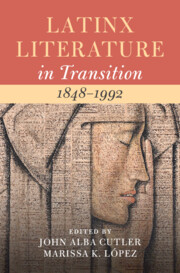Book contents
- Latinx Literature in Transition, 1848–1992
- Latinx literature in transition
- Latinx Literature in Transition, 1848–1992
- Copyright page
- Dedication
- Contents
- Figures
- Contributors
- Acknowledgments
- Introduction
- Part I Space
- Part II Being
- Chapter 5 Brown Modernism from María Cristina Mena to Gloria Anzaldúa
- Chapter 6 The Spanish–Indigenous Binary and Anti-Blackness as Literary Inheritance
- Chapter 7 The Camaraderie of Influence
- Chapter 8 Spiritual Service and Gendered Labor
- Part III Time
- Part IV Form
- Part V Labor
- Bibliography
- Index
- References
Chapter 8 - Spiritual Service and Gendered Labor
Rereading Religion and Labor in … y no se lo tragó la tierra and Face of an Angel
from Part II - Being
Published online by Cambridge University Press: 10 April 2025
- Latinx Literature in Transition, 1848–1992
- Latinx literature in transition
- Latinx Literature in Transition, 1848–1992
- Copyright page
- Dedication
- Contents
- Figures
- Contributors
- Acknowledgments
- Introduction
- Part I Space
- Part II Being
- Chapter 5 Brown Modernism from María Cristina Mena to Gloria Anzaldúa
- Chapter 6 The Spanish–Indigenous Binary and Anti-Blackness as Literary Inheritance
- Chapter 7 The Camaraderie of Influence
- Chapter 8 Spiritual Service and Gendered Labor
- Part III Time
- Part IV Form
- Part V Labor
- Bibliography
- Index
- References
Summary
This chapter asks how religion has been understood in Chicanx literature by connecting the performance of syncretic spiritual labor with the task of telling stories about the exploitation of Chicanx labor. It takes Tomás Rivera’s 1971 … y no se lo tragó la tierra (Tierra) and Denise Chávez’s 1994 novel Face of an Angel (Angel) as test cases. By closely revisiting a work of criticism that is emblematic of the way Chicanx literary criticism approaches the role of religion in literature, this chapter shows how reproductive labor, service labor, and syncretic religious labor are inadvertently obscured by the urgency of attending to class identity and farm labor in the case of Tierra, or non-religious spirituality and fetishized indigeneity in the case of Angel. In particular, the chapter returns to Ramón Saldívar’s germinal reading of Rivera’s novel and Theresa Delgadillo’s incisive interpretation of Chávez’s novel to explore how subtly and entirely certain subjectivities become illegible. Drawing inspiration from scholars such as Judith Butler, the chapter scrutinizes notions of agency within gender performance and advocates for a paradigm shift that acknowledges the deeper significance found in seemingly menial tasks, such as washing dishes or clearing used plates.
Keywords
- Type
- Chapter
- Information
- Latinx Literature in Transition, 1848–1992 , pp. 143 - 160Publisher: Cambridge University PressPrint publication year: 2025

